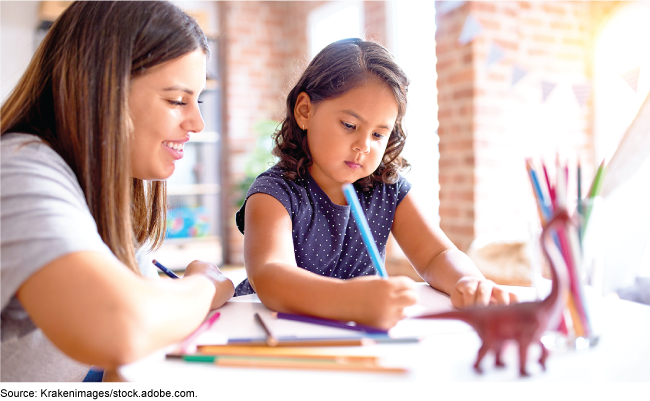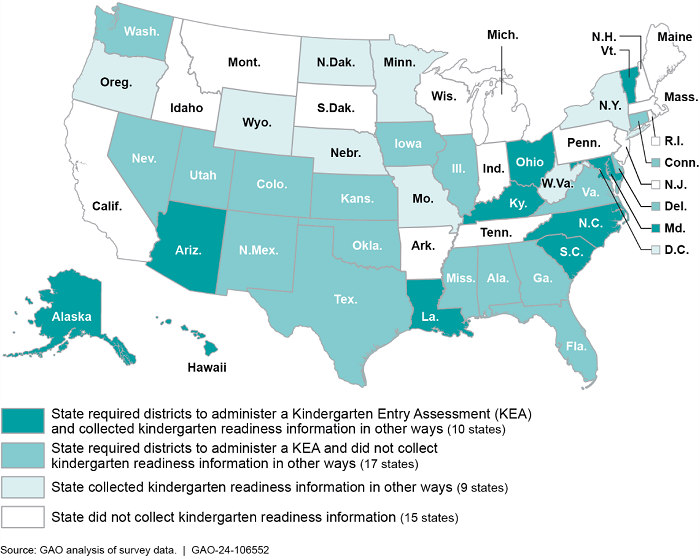K-12 Education: State and Selected Teachers' Use of Kindergarten Readiness Information [Reissued with revisions on Oct. 23, 2024]
Fast Facts
About 3.3 million children were enrolled in kindergarten in 2024. But do states know how ready they were?
Children have varying degrees of the social, emotional, language, motor, and other skills that they need to be successful in kindergarten. 27 states required their school districts to formally assess children's "kindergarten readiness" for the 2023-2024 school year. Kindergarten teachers told us that these assessments can help them identify children who need extra support—e.g., more reading or math lessons.
They also said the assessments can impede instructional time and may be challenging for some children if administered on a computer.

Revised October 23, 2024 to correct the shading of figure 1 on page 2.
Highlights
What GAO Found
Kindergarten entry assessments (KEA) are one way states and school districts examine children's readiness to learn in a classroom setting. According to responses to GAO's survey from all 50 states and the District of Columbia, 27 states required school districts to administer a KEA during the 2023–2024 school year. Nine states did not require a KEA but reported collecting kindergarten readiness information in another way (such as through literacy or pre-kindergarten assessments). Fifteen states did not collect any kindergarten readiness information at the state level. When asked why they did not collect kindergarten readiness information, the most common reasons cited were that it was local districts' responsibility (four states) or the lack of a legal requirement (three states).
States’ Reported Efforts to Collect Kindergarten Readiness Information, 2023–2024 School Year

Notes: There is no federal requirement for districts to assess kindergarten readiness for all kindergarten students. All 50 states and the District of Columbia responded to GAO’s survey.
Most states that choose to use KEAs require districts to assess multiple areas of kindergarten readiness, especially early literacy, early math, language skills, and social and emotional development, according to GAO's survey.
Twenty-two states reported analyzing KEA data aggregated at the state level during the 2022–2023 school year. For example, states examined differences in kindergarten readiness by English learner status (15), disability status (14), or race or ethnicity (14). In terms of how the 22 states used their KEA data, 17 used it to inform the public, and 16 used it to meet state legislative requirements.
Teachers in all six of GAO's discussion groups—which were held with kindergarten teachers in six of the states that reported requiring KEAs—stated that administering multiple assessments in the kindergarten year is time consuming. All six discussion groups also said that assessments typically need to be conducted one-on-one, which can take time away from helping students acclimate to school and learn classroom norms, particularly early in the kindergarten year. Most discussion groups also said that it takes time for students to learn the technology used for some assessments and expressed concern that assessments were measuring students' ability to use technology rather than assessing their academic skill base.
In all six discussion groups, teachers said they used kindergarten readiness information to
- identify students in need of additional supports;
- assign kindergarteners to learning groups, such as reading groups; or
- understand kindergarteners’ baseline skill levels.
Finally, discussion groups noted several challenges with using information from assessments, including concerns about relevance for instruction and accuracy. For example, four groups noted that because some assessments are administered a month or more after classes begin, the results get “stale” quickly and may not accurately represent baseline skills given how quickly kindergarteners learn. Six of the groups also expressed concerns about the accuracy of kindergarten assessment information for some students, such as for kindergarteners who are English language learners.
Why GAO Did This Study
The early elementary school years are widely understood to be critical to a child developing a strong foundation for future academic success. Kindergarten readiness refers to the skills and abilities children need to succeed in school, including social and emotional development, language acquisition, and physical well-being. States have discretion regarding whether, and how, to collect kindergarten readiness information. Consequently, little is known about kindergarten readiness levels nationwide.
GAO was asked to provide information on which states assess children's readiness to learn upon entering kindergarten. This report provides information on state KEA requirements and how states analyze and use kindergarten readiness information for children attending public schools. It also provides information on selected teachers' experiences with administering assessments early in the kindergarten year and using the results, among other topics.
GAO surveyed state education and early childhood officials in all 50 states and the District of Columbia and achieved a 100 percent response rate. GAO also held six discussion groups with a total of 30 kindergarten teachers. Each group included kindergarten teachers from one of six states—Alaska, Arizona, Illinois, Iowa, Maryland, and North Carolina—selected for geographic diversity among the 27 states that reported KEA requirements. GAO randomly selected kindergarten teachers to recruit within the six discussion group states from a database of teacher contact information. GAO sent invitations to those randomly selected teachers until achieving its goal of recruiting six to eight potential participants for each group. Last, GAO reviewed relevant federal laws.
For more information, contact Jacqueline M. Nowicki, (202) 512-7215 or NowickiJ@gao.gov.
